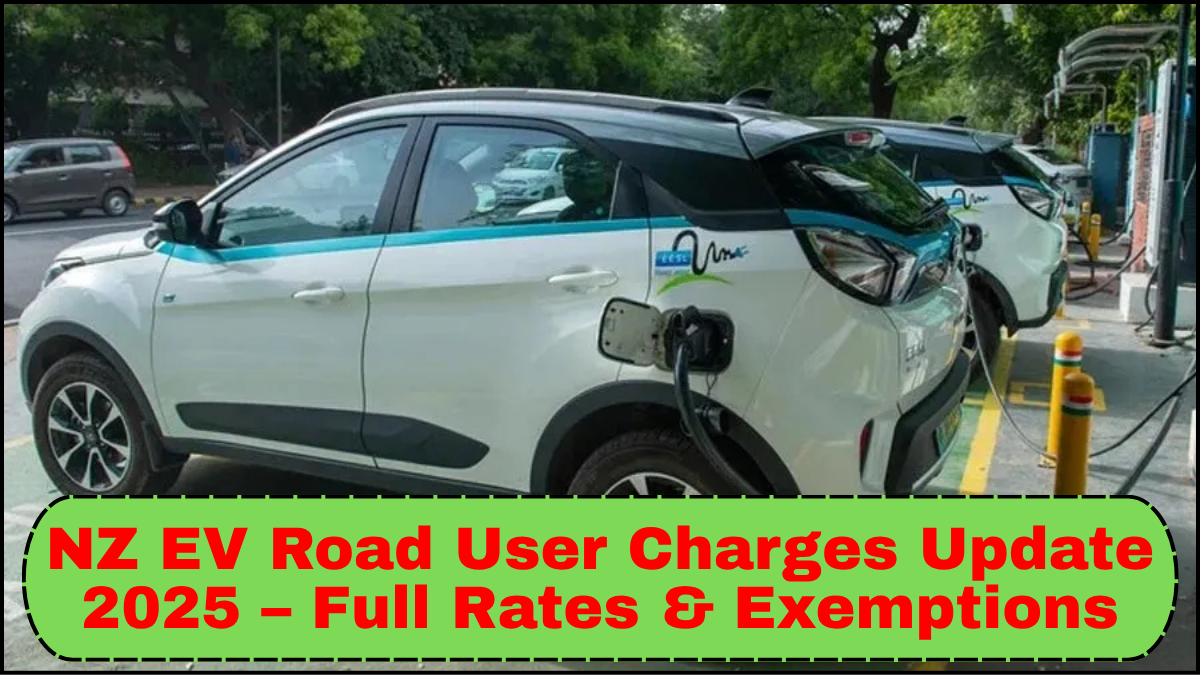As electric vehicles (EVs) gain popularity across New Zealand, the government has taken steps to ensure road maintenance funding keeps pace with the growing EV fleet. The NZ EV Road User Charges Update 2025 marks a significant policy shift that ends the longstanding exemption for EV owners, bringing them in line with other vehicle users who contribute to road upkeep through mileage-based fees.
In this article, we provide a detailed breakdown of the updated electric vehicle RUC NZ framework, current rates, exemptions, and what EV drivers can expect moving forward.

Why Road User Charges Now Apply to EVs
Until April 1, 2024, fully electric vehicles were exempt from paying road user charges (RUC)—a system traditionally used for diesel and other non-petrol vehicles that don’t contribute through fuel taxes. As the number of EVs on the road increased, so did concerns over fair contribution to infrastructure costs. With the NZ EV Road User Charges Update 2025, EVs are now officially included in the RUC system.
This update supports equitable cost-sharing and ensures that all vehicle owners contribute to maintaining New Zealand’s roads.
Current EV RUC Rates in 2025
As of June 2025, the following RUC rates apply to electric vehicles:
-
Standard EV (up to 3,500kg): $76 per 1,000 km
-
Heavy EVs (over 3,500kg): Rates vary depending on axle configuration and weight; starting at approximately $76 to over $200 per 1,000 km
-
Plug-in Hybrid Electric Vehicles (PHEVs): Charged at a reduced rate, currently $53 per 1,000 km
These charges are identical to those paid by light diesel vehicles. The intention is to standardize contributions based on mileage charges, not fuel type.
How to Purchase RUC for Your EV
RUC licenses must be purchased in advance in blocks of 1,000 kilometers. Drivers can purchase them through:
-
NZTA online portal
-
Vehicle licensing agents (e.g., VTNZ, AA)
-
Mobile app (for eligible EVs)
Failure to maintain a valid RUC license may result in fines or penalties, and roadside checks are increasingly common.
Exemptions and Special Considerations
While the exemption for fully electric vehicles has ended, a few groups still benefit from RUC relief:
H3: Temporary Exemptions for Some Commercial Fleets
Government programs aimed at supporting commercial EV uptake may offer time-limited RUC discounts or credits. Fleets transitioning from diesel to electric could qualify under sustainability incentives.
H3: Mobility and Disability Transport Vehicles
Vehicles used exclusively for transporting people with disabilities may still qualify for RUC exemptions. Owners must apply and provide documentation to NZTA.
H3: Hydrogen Fuel Cell Vehicles
Hydrogen-powered vehicles remain exempt under current legislation, though this could change in future updates.
Key Impacts on EV Owners
The NZ EV Road User Charges Update 2025 changes the economics of EV ownership. While EVs remain more efficient and cost-effective to run than petrol or diesel vehicles, owners now need to factor in RUC when calculating total cost of ownership.
Budgeting for Mileage Charges
If you drive 10,000 km per year, the RUC will add $760 annually to your vehicle costs. For high-mileage users, such as rideshare drivers, this cost could exceed $1,500 annually.
Encouragement Toward Efficient Travel
By tying charges directly to mileage, the government incentivizes smarter travel habits, carpooling, and better trip planning.
Government Justification and Long-Term Vision
According to the Ministry of Transport, this policy is designed to:
-
Preserve fairness among vehicle users
-
Ensure sustainable road funding
-
Prepare for a future dominated by EVs
The transition also aligns with the government’s broader climate goals, ensuring that while EVs reduce emissions, they still contribute to shared infrastructure.
FAQs – NZ EV Road User Charges Update 2025
Q1: When did the EV RUC exemption officially end?
A: The exemption ended on April 1, 2024. From this date onward, EVs are legally required to pay RUC.
Q2: Are PHEVs also subject to the same RUC?
A: Plug-in hybrids pay a reduced RUC rate of $53 per 1,000 km due to their partial use of petrol.
Q3: How are RUC rates calculated for EVs?
A: The rate is set per 1,000 kilometers, with standard EVs paying $76 per 1,000 km, matching diesel vehicles.
Q4: Do RUCs apply to electric motorcycles?
A: No, electric motorcycles remain exempt from RUC as they fall below the minimum weight threshold.
Q5: Can I get a refund for unused RUC distance?
A: Yes, but only if you can prove the kilometers were not used (e.g., in case of vehicle sale or write-off).
click here to learn more